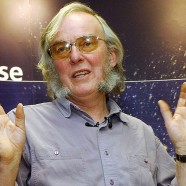Louisa Preston on The Sky at Night episode ‘The Hunt for ET’
Astrobiologist (and ASB Treasurer) Dr Louisa Preston recently appeared as a guest on the BBC’s Sky at Night September episode ‘The Hunt for ET’ alongside Dr Adam Rutherford. She spoke about the search for biosignatures in the atmospheres of exoplanets and how we might be able to detect intelligent life on distant worlds. You can watch the section of the show featuring Louisa on the BBC website. Other recent appearances from Louisa include a Lost Lecture on the subject of Life on Mars and a TED-Ed lesson on extremophiles and astrobiology.
Read MoreGuest blog post from the UKSEA’s Simon Evetts
There is a lot of highly interdisciplinary research taking place in the UK space research community, and several organisations exist to provide a focus to such work. We asked Simon Evetts, of the UK Space Environments Association, to give an overview of the UKSEA and its aims. In recent years there has been increasing recognition in the UK for the need to better communicate and coordinate across the disciplines that use aspects of the space environment for R&D. These domains of activity, for example space biomedicine, astrobiology and microgravity physics, do not appear to have obvious...
Read MoreRoyal Society announces Colin Pillinger memorial award
The Royal Society has announced an award in commemoration of Professor Colin Pillinger CBE FRS. Professor Pillinger passed away in May, and is perhaps best known as the driving force behind the UK-lead Beagle 2 mission to Mars. Amongst many other projects, he was deeply involved in the ESA Rosetta mission to comet 67P/Churyumov–Gerasimenko, having proposed one of the Philae lander’s instruments, the Ptolemy mass spectrometer. The Colin Pillinger International Exchanges Award is designed to stimulate international collaboration between leading scientists. Applications for the award will...
Read MoreObituary: Professor Barrie W. Jones (1941–2014)
It is with great sadness that we note the passing of Prof. Barrie W. Jones, on Saturday 4th October. Barrie died peacefully in Milton Keynes Hospital, finally succumbing to a series of infections that he had been fighting for the last few months of his life. Barrie first remembered becoming interested in astronomy at the age of 10, following a public talk and observing session about the planet Mars, at Cardiff Municipal Observatory. Inspired by this, he soon took to work, building his own Newtonian reflecting telescope, complete with a 6” mirror that he ground, polished, and silvered...
Read MoreFrom planetary instrumentation to geological repositories
The GeoRepNet 2/RATE meeting will take place at the British Geological Survey headquarters near Nottingham on October 23rd and 24th this year. The meeting is looking at high technology transfer to geological repositories, including the use of planetary instrumentation, to advance the study of geological repositories for radiation waste storage and carbon capture and storage. The preliminary programme is up here and you can register here.
Read MoreNew BoingBoing feature on the Boulby subsurface laboratory
Get the low-down (sorry) on the dark matter and astrobiology lab hidden from view deep under the Yorkshire coast from the ASB’s very own Lewis Dartnell. I’m standing apprehensively in the gloomy dark, my entire body vibrating with the shuddering metal cage I’m in, and surrounded by an overwhelming roar of air that’s not so much heard as felt. I turn my head to peer out through a gap in the cladding and see the enveloping cliff of rock rushing past. This is the lift serving the Boulby Mine on the north-east British coast, one of the deepest in Europe. The gale of air...
Read More






